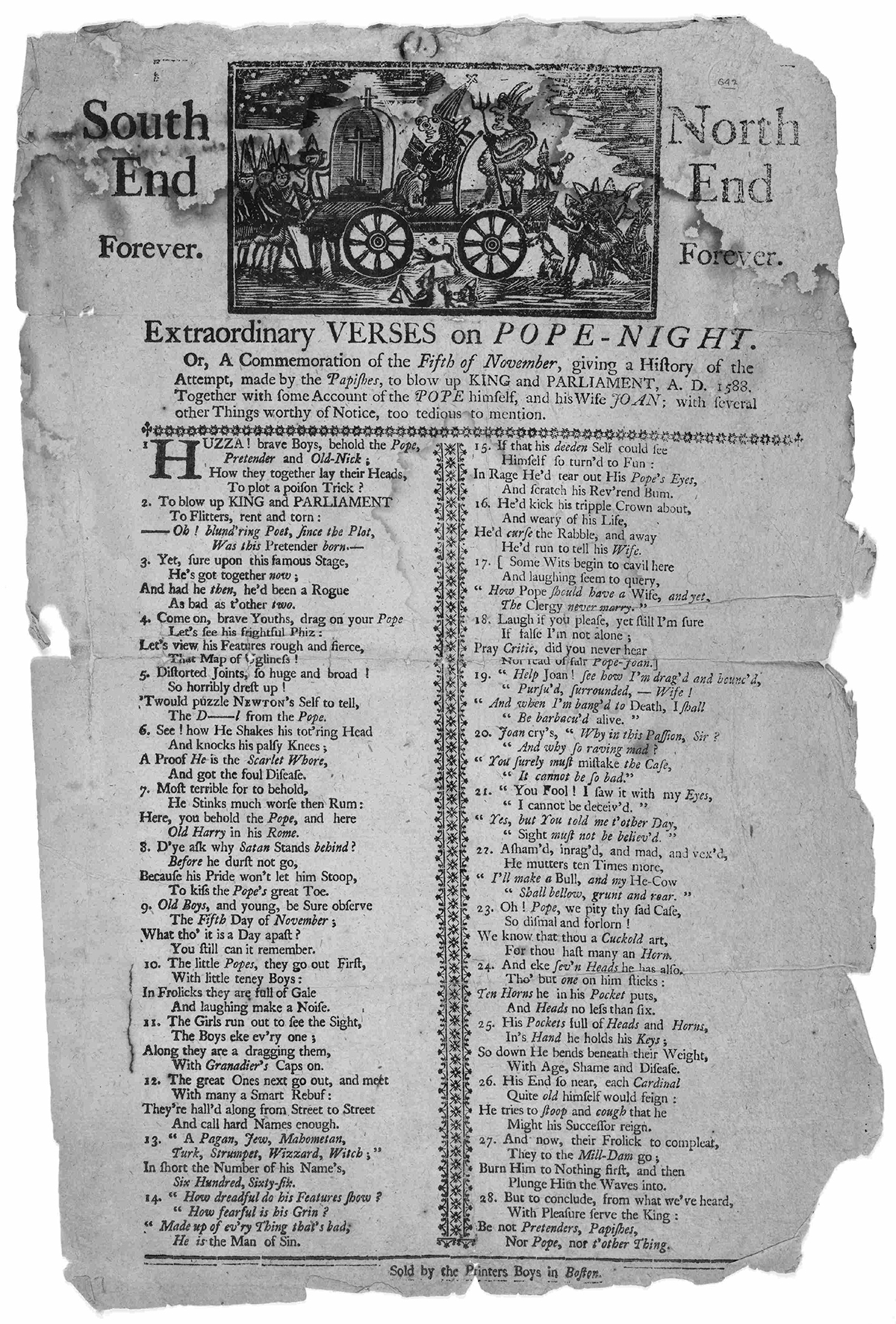Throwback Thursday: Guy Fawkes Day in Early Boston

The story of Guy Fawkes image via Wikimedia Commons
November 5th marks Guy Fawkes day—the British (and early Bostonian) holiday which remembers the actions of, you guessed it, the famed British rebel Guy Fawkes.
It’s an anniversary that has to do with fire and explosives, so naturally, it’s celebrated with fire and explosives. Referred to as Bonfire Night in Great Britain, people attend fireworks shows, have bonfires, and burn effigies of the man of the hour. But colonial New England had its own type of celebration.
To recap, Guy Fawkes was a Roman Catholic activist in 17th century Britain. Catholics during this time were being persecuted, and when Protestant King James I took the throne without putting an end to their treatment, Fawkes and a dozen of his friends sprang to action. They planned to blow up Parliament on November 5, 1605 with the King inside.
What is known as the Gunpowder Plot did not go according to plan. Fawkes, who was in charge of lighting fuses in the basement of Parliament, was discovered by guards, and later met the fate of all those who commit high treason—being hanged, drawn, and quartered.
November 5th was declared a national day of thanksgiving by Parliament a year after the failed explosion attempt. Unlike the celebrations of today, early celebrations of Guy Fawkes day were anti-Catholic in tone. In the American colonies, Guy Fawkes Day was referred to as Pope’s Day. In Boston, rivaling groups of men from the North End and the South End would parade effigies of the Pope, the devil, and disliked political figures. When night fell, the groups would meet to brawl, with the winners of the fight taking all of the effigies to their own bonfire. Such brawls became violent—in 1764, a young boy was run over and killed by a cart in the parade.
The angry crowds of Pope’s Day festivities became associated with Parliamentary tax protests over the next decade. While it is these sentiments that led to the Revolution, it was the Revolution’s most famous general who dampened Pope’s Day celebrations in the States— George Washington called for an end to the celebrations in hopes of gaining Canadian French Catholics as allies.
If you’d prefer not to take orders from George Washington, you can celebrate Guy Fawkes Day with some casual effigy-burning and poem-reciting. The famous English folk poem commemorating the events of November 5th experienced a rise in popularity after its use in the 2006 movie adaptation of the much-loved late ’80s comic book, V for Vendetta:
Remember, remember!
The fifth of November,
The Gunpowder treason and plot;
I know of no reason
Why the Gunpowder treason
Should ever be forgot!
Guy Fawkes and his companions
Did the scheme contrive,
To blow the King and Parliament
All up alive.
Threescore barrels, laid below,
To prove old England’s overthrow.
But, by God’s providence, him they catch,
With a dark lantern, lighting a match!
A stick and a stake
For King James’s sake!
If you won’t give me one,
I’ll take two,
The better for me,
And the worse for you.
A rope, a rope, to hang the Pope,
A penn’orth of cheese to choke him,
A pint of beer to wash it down,
And a jolly good fire to burn him.
Holloa, boys! holloa, boys! make the bells ring!
Holloa, boys! holloa boys! God save the King!
Hip, hip, hooor-r-r-ray!

An account of the South End/North End rivalry on Pope’s night. Image via Wikimedia Commons


